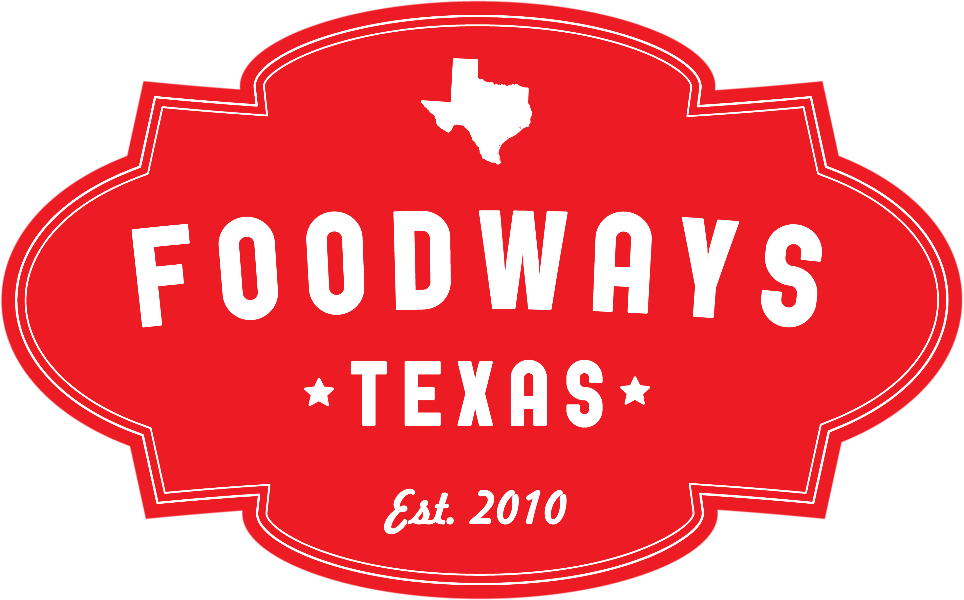Interviewer: Andrew Gansky, Kirsten Ronald, and Sherri Sheu
Location: Joe T. Garcia's Mexican Restaurant, 2201 North Commerce Street, Fort Worth, TX 76164
This interview for the Texas Iconic Restaurant Oral History project was produced in collaboration with the Department of American Studies at the University of Texas, Austin, and the Texas Restaurant Association.
On July 4, 1935, Joe T. & Jessie Garcia opened Joe T. Garcia’s Mexican Restaurant in part of their home in Fort Worth, Texas. Upon opening, the tiny house had a maximum seating capacity of sixteen.
The Garcias served their famous enchiladas in the front room while they slowly expanded their home over the next few decades to accommodate more customers and their growing family. Today, the restaurant encompasses most of a city block and can serve around 2000 customers on the weekends.
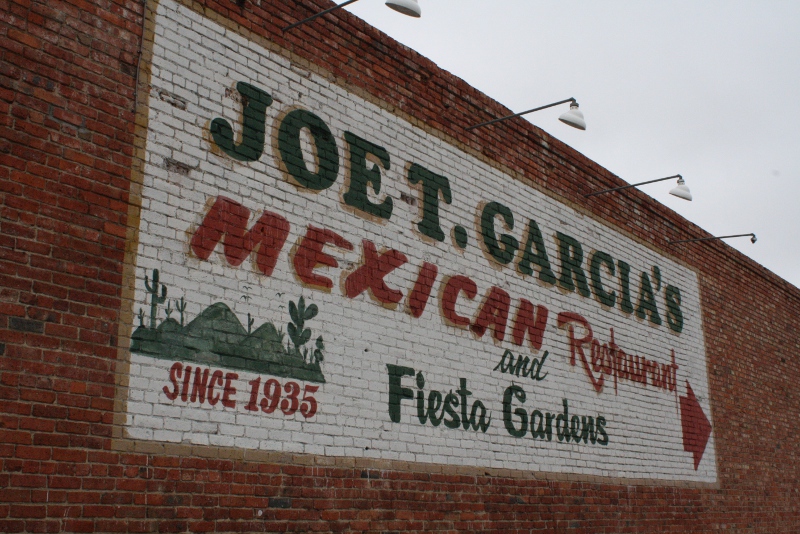
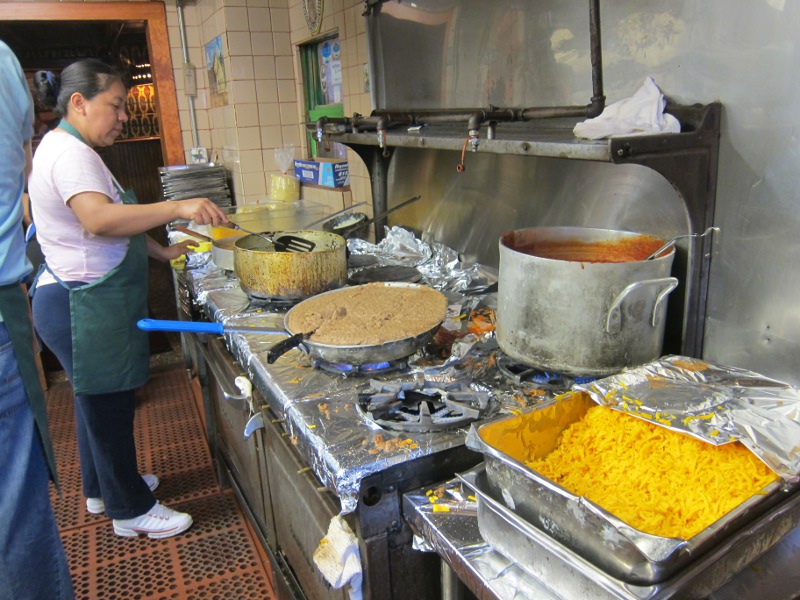

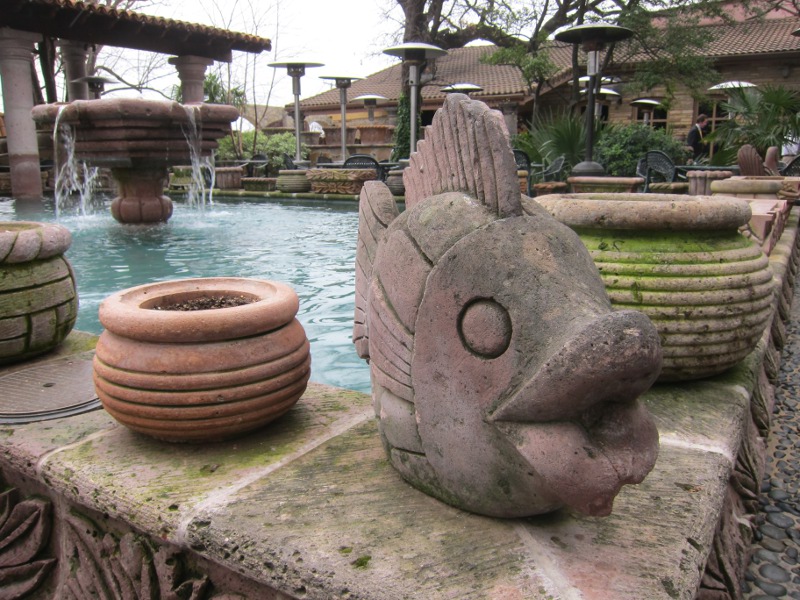
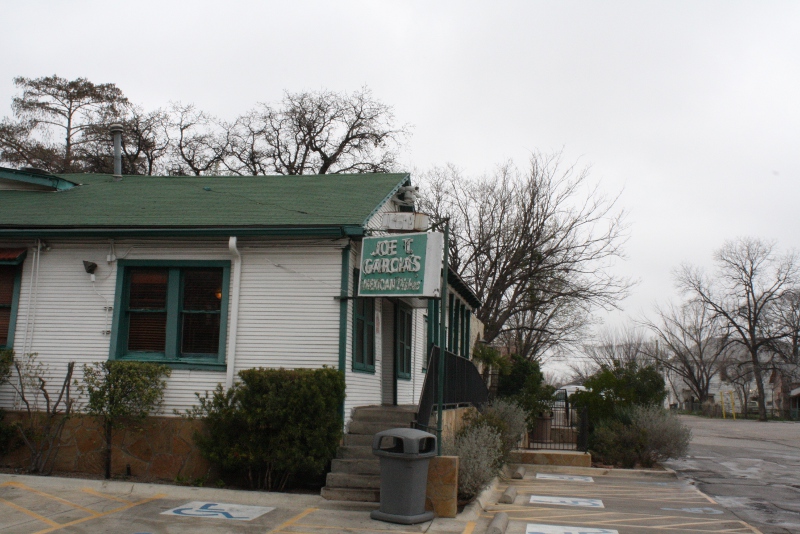
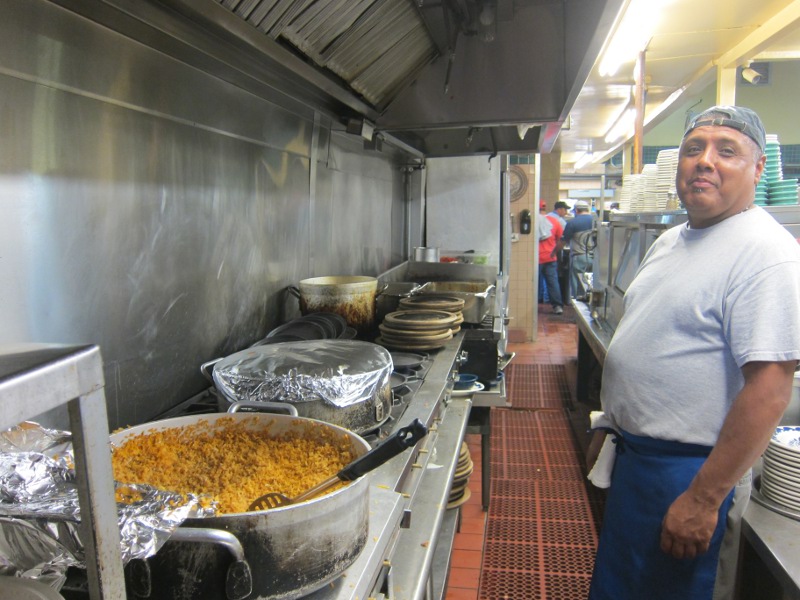
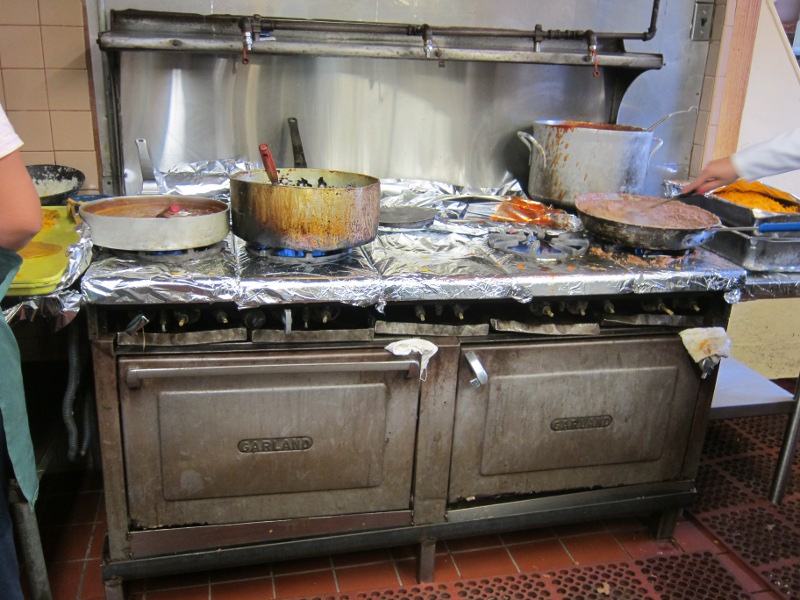
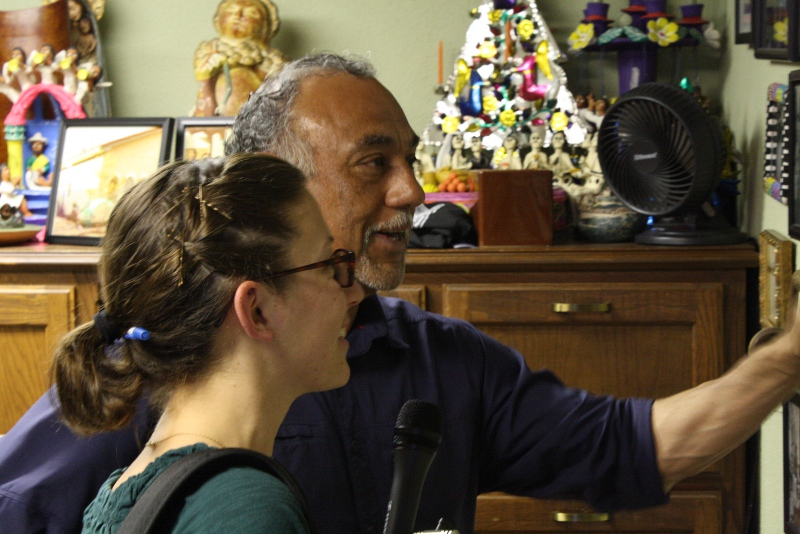
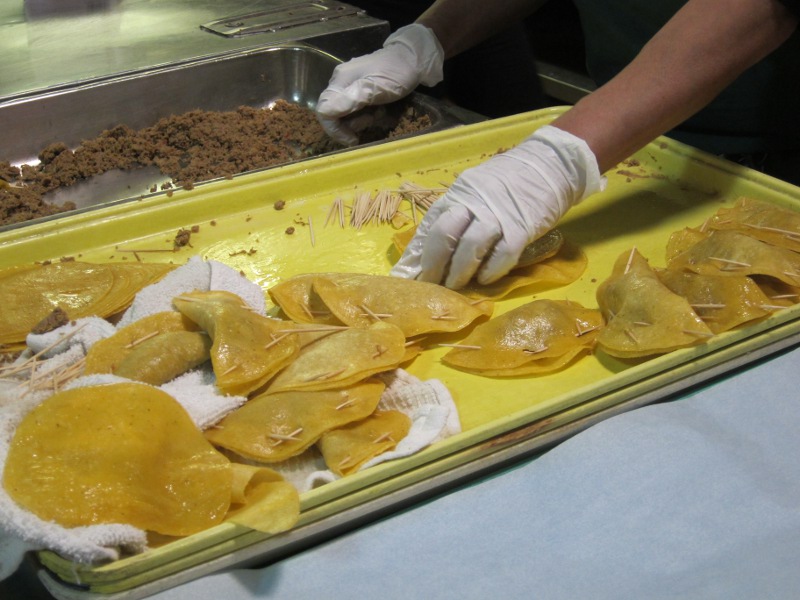
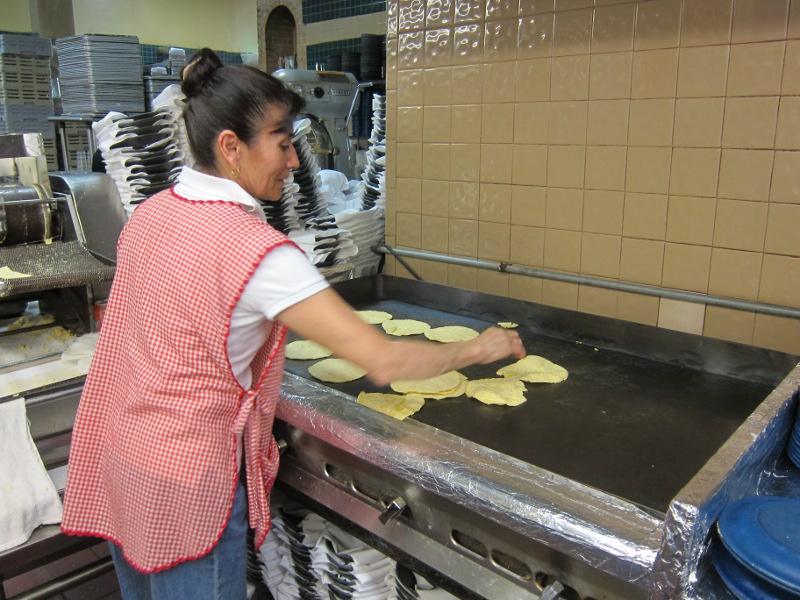
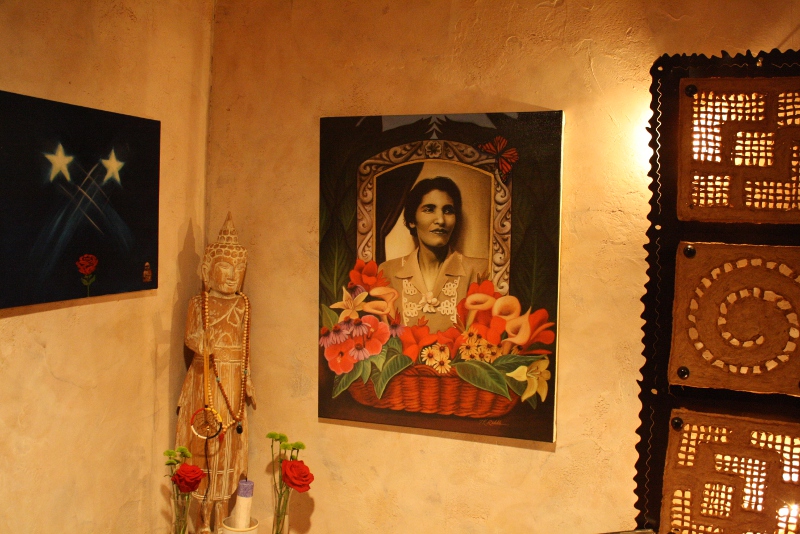
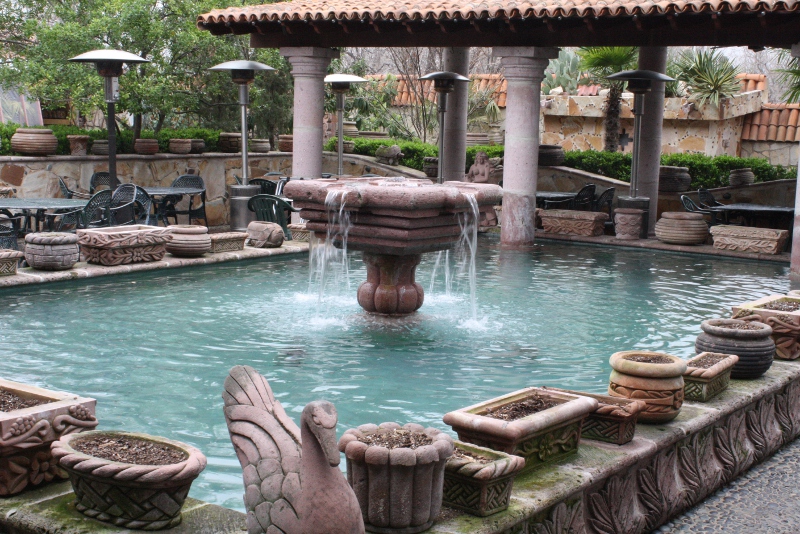
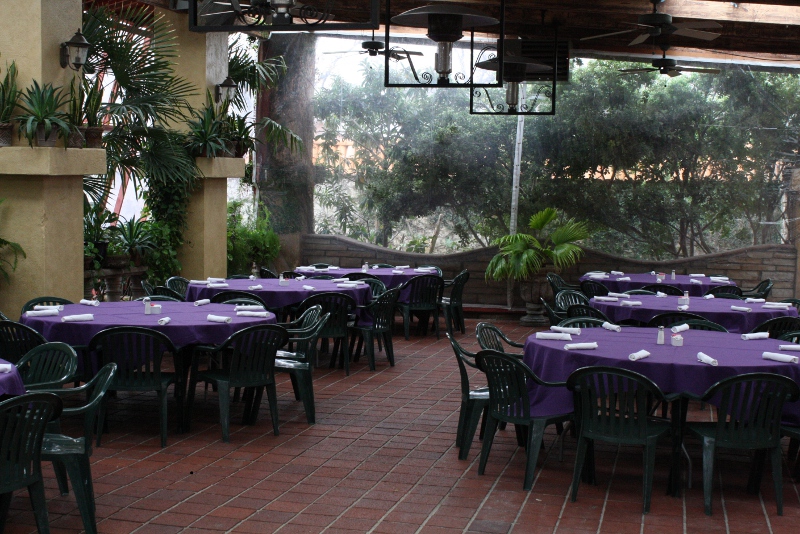
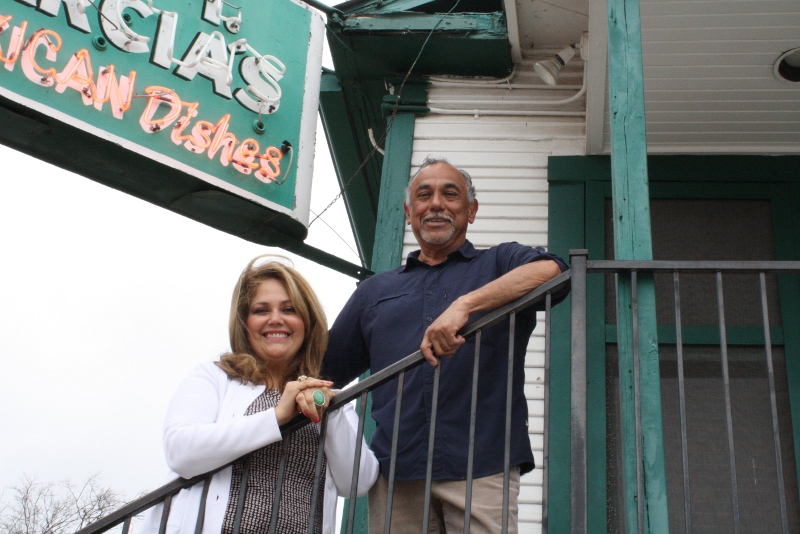
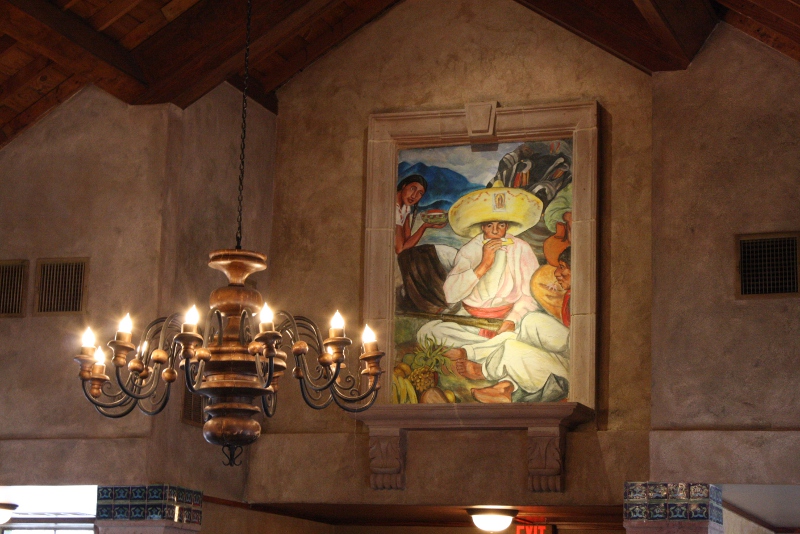
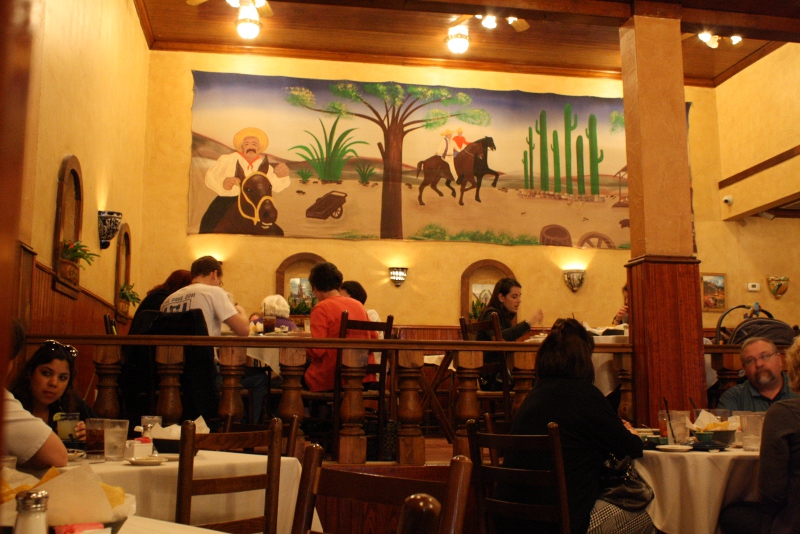
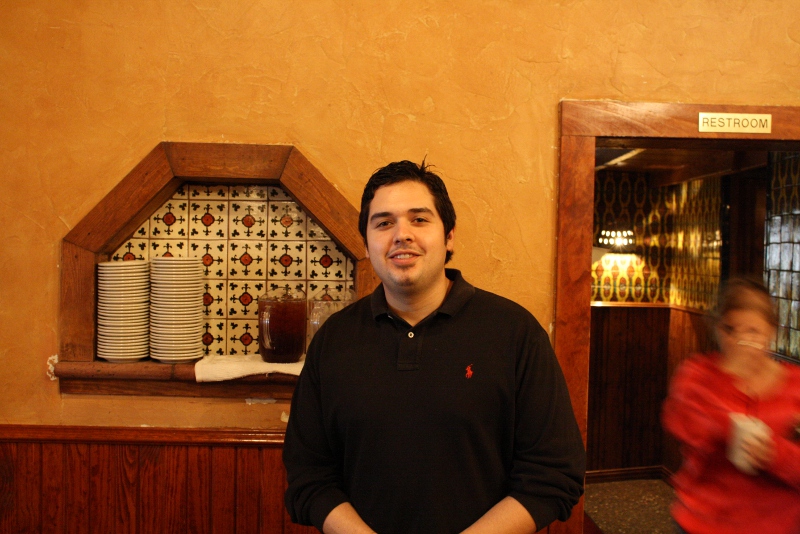
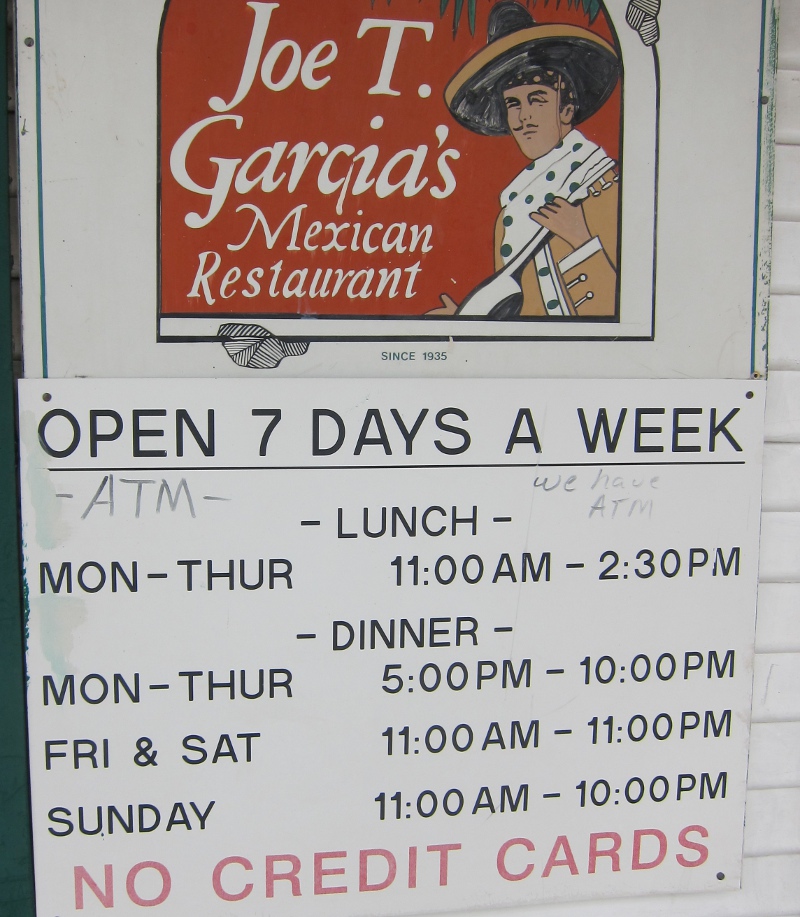
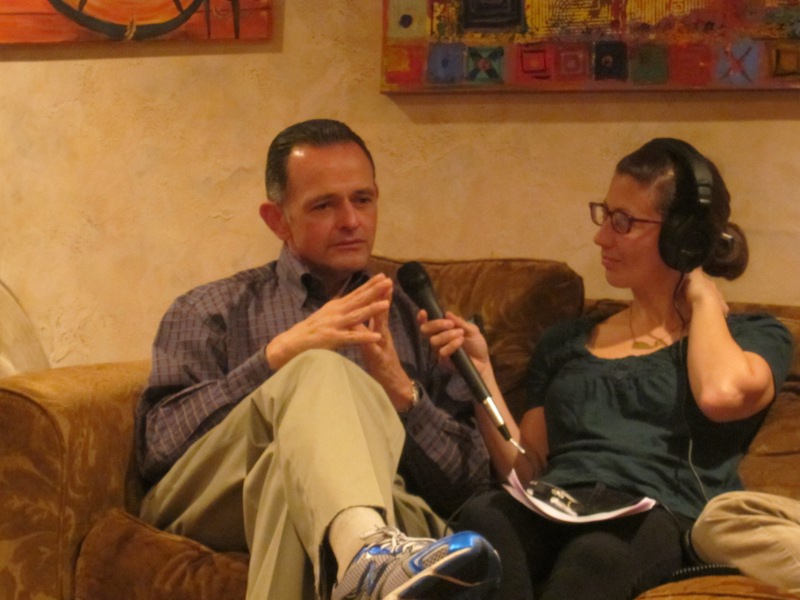
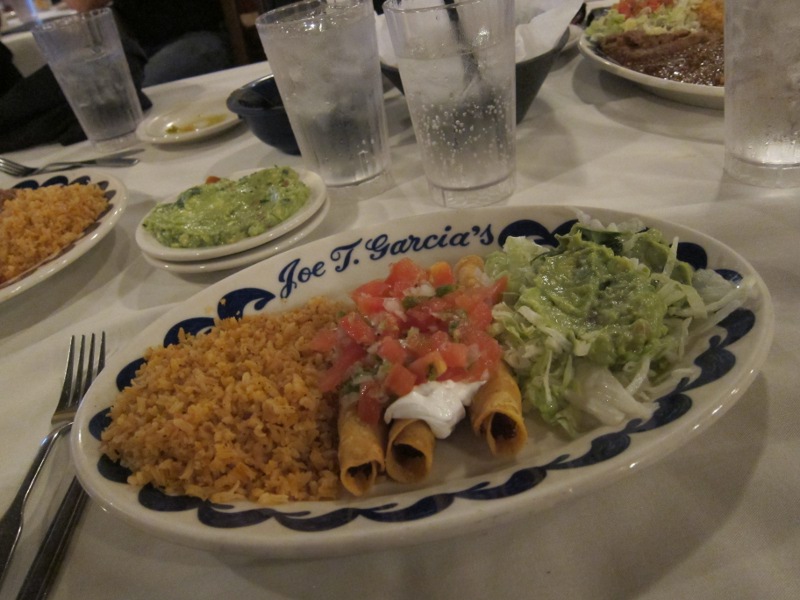
Kirsten Ronald: Alright, this is Kirsten Ronald, Andrew Gansky and Sherri Sheu. We’re here with—we’re here with Lanny [Coughs]—excuse me—Lanny Lancarte, Joe Lancarte, and Jody Lancarte from Joe T. Garcia’s. It is Tuesday, Feburary 28th at 10:30am, and this is our fabulous oral history. Are you gentlemen ready? Okay, so my first questions are just about the history of the restaurant in general. I know if you’re looking at my sheet ahead of time so the first one is just very basic: can you give us the story of the restaurant, however you like to do the story?
Joe Lancarte (JL2): Well, uh, you know Jessie and Joe T. Garcia who started the restaurant back in 1935 which is in the—if people are familiar with coming into the main dining room—it’s just that front room which is really in 1935 was really half that room—we only had six tables of four when we first started back then and it was just a small, little restaurant.
KR: Okay. Okay and then, keep going—what happened?
JL2: Okay, well and then beyond that—
Jody Lancarte (JL1): They had the grocery store.
JL2: Well, of course, yes and if you go beyond that uh they started the grocery store in 19-
JL1: Oh gosh, it must have been—
Lanny Lancarte (LL): Probably 1932.
JL2: ‘32—say between ‘30 and ’32—somewhere in the ballpark, sorry I don’t have the exact number. They started with just a little grocery store. They used to serve a lot of people from the packinghouse. You know they would come in and everybody, you know buy lunchmeat, things like that, sandwich meats, you know. And one of the packers, you know, asked if she could make her—him something to eat if I’m correct. And, and then she started making you know little items then, and my grandfather said, “Well, heck, if you want to do that, let’s just go ahead and open a restaurant.” Which they did in 1935, which is that little front room. And started with just that front room there. They opened up the banquet room which was the—well, of course they enlarged the front room, and then made the back dining room which you’ll have to look at some of the old pictures and it had four long tables back then. And so that was back in the forties. So we didn’t start adding anymore until the late sixties and then 1970 when we started the patio. The patio first started with just the front part which there was a small pool area there and the original reason the pool was built in 1970, was, of course—when we were kids we grew up here. You have to understand it goes back that we actually lived on premises back in the back, and so this was also our home, besides being a restaurant. So we wanted a pool when we were kids and so they built that and my brother, who has an unbelievable mind and that could just picture—Lanny—my brother here—who could, you know, I mean he is really incredible. I’ve always admired his way of thinking, and how he can think so far ahead uh that he had this vision of “Hey, let’s not just not build this we can also make it into a patio” which we would serve parties and which is what we did. Let me also include my brother David—my brother David passed away a few years ago—him and David worked together building the patio and they—so we would serve private parties in the evenings when the, you know, the—for the patio and then, and when there wasn’t any parties, we would open it to the public. There was such a demand for the patio we enlarged it and added in 1980, you know, another section, and, and moved the parties in that area. Of course, they just kept growing after that and more people wanted to book outside, and we added more dining rooms until we finished everything in 1998 and finished the back part of the patio, which we can serve quite a number of people now in the dining areas.
KR: About how many people can you serve, if you have a full house?
JL1: Oh—
JL2: We can serve probably about a thousand people, somewhere in that ballpark. Yeah.
KR: Have you ever been that full?
JL2: There’s no question we have. I mean, there could be two or three hundred people waiting in line for the patio alone without—not including—the inside, you know. So, so it’s wonderful, yeah. You know, what’s so great—and actually just the other day we had—it was raining and—or sprinkling, may I say—and the patio was closed. It was a couple of Saturdays ago and they were out, in line, and waiting to come in, and had umbrellas. I mean, you know, when you see something like that—I mean it says a lot, you know, and I really mean that. I mean we, we really do love our customers and we appreciate that what they do to come and when they eat here which says a lot for us. And you can’t help but appreciate that.
KR: Yeah, for sure, actually that is definitely not the next question on my list but that that raises a big question for me and—I’m curious—just how have the customers changed over the time that the restaurant has been open or since that you’ve been involved in it?
JL2: Well, what do you mean change? As in what?
KR: Well, have you noticed a different kind of clientele? Or, have you noticed—I know it has been expanding a lot, so I’m just curious who’s been coming into the restaurant.
JL1: [unintelligible] We have multi-generation customers.
JL2: Right. Exactly. There’s been four generations of customers as Jody says, of people coming out here. I’ll give you a for instance. I had a gentleman, I remember it was one Christmas Eve and this gentleman stands up in the middle of the dining room and goes, in the middle of the dining room, “I’ve been coming here for over forty, you know, forty-five years! And every Christmas Eve.” And then somebody else stands up and says “I’ve been coming in for thirty years,” and you know, on and on and on as you can understand and you got to remember these people have been bringing their children bringing their children and bringing their children. That is wonderful. That is huge. You—when I see a child, when someone brings in their—you know there was a waiter that worked here many years ago. He has three children, now, I said, he goes, “Hey, we brought the kids.” I said, you got to understand, I love those kids for a lot of reasons but I mean those are our future. I mean they will someday be out here having dinner and bringing their family. And that’s how you look at it, without a question.
[00:05:49]
KR: Have you seen the same growth in the people that you—that work here as well?
JL2: The same growth as in?
KR: As in, the same growth as in the same people coming back to work or like families working here and generations of families?
LL: Let me answer that. On that one, it would be like our kitchen staff, which has been here—has been here—Juanito our oldest one has been here probably almost forty years. The majority of them have been here probably fifteen to twenty-five years, in that range of things. So, most of our people, especially those who have been with us for along time has been our kitchen staff, which has been with us forever. Our employees—like the waiters and stuff—most of them are working their way through TCU [Texas Christian University] or through college and stuff like that and they’re, they’re—now actually we have in the last few years their kids since they were waiters. I’m hiring them as waiters here now. So the guys that went through school, and everything else, so, we almost keep the same thing in the generations in the people that work here as waiters. Their dads and or their mothers had worked here and know kind of the family real well and now they want their kids to go through the same thing, whether they’re going through TCU or wherever. So yeah, it’s a, uh, uh it almost stays the same you, you know and uh, so—both of them, not really. Forgot. Cut that. [Laughs]
KR: I’ll try. Anyway. Awesome.
LL: Talk to Joe. [Laughs]
KR: Sorry. So I guess my next question in relating to the generational thing, can we talk about how you three got involved with the restaurant?
JL2: Well, how us three? Well, you have to understand that there’s not just us three, you know, we have other siblings also who are also involved in the restaurant and my mom’s always kind of, you know. Again, remember starting back, let’s go, well, let’s say the sixties, you know, when the people who worked here were mostly family. I mean, Lanny was on the—Lanny would know probably better where everyone was exactly. But, you know, Lanny was either on the register, he was on the stove in the kitchen. Of course, at the very beginning the stove—my mom was on the stove, my grandmother, who rolled the enchiladas—correct me if I’m wrong Lanny—my dad who made the tacos and, you know, sent off the tacos and the guacamole and all that, and Lanny was up front, and David was in the back room—he waited on tables. Lanny waited on the front room, and Zurella was also in there, right? But it was mostly you and David at the very beginning. And y’all were the oldest. You know, obviously, well, the older boys, you know—the older children, you know, waited the tables. And as we grew up, you know, we waited tables also and progressed from there. For myself, you know, like I said, there was Lanny, there was David, and Zurella. There’s myself Joe, and Jesse, Philip and Liz. And, you know, we all did something, and, you know, I ran the register. Jody, she ran the register for years and besides as Lanny—just—without a question, let me say, always, Jody’s been like an older sister to me, without a question. I mean, I mean, she, I mean, I think the world of Jody and I mean she’s always like, “Hey, Joe, you need to be doing this!” “Alright! Alright! Yes ma’am.” You know, and you know, whatever it took, you know. You know, and I was very fortunate to grow up in a wonderful family, and Lanny to guide us and everything, and, and send us in the right direction, you know. And, but, you know, it is—is great, but it’s something that, you know, you don’t appreciate until you get a little bit older and realize what—where you’ve been and what you’ve done, and then you appreciate all that has come, too.
KR: Do you want to talk a little bit more about what that means?
[00:09:26]
JL2: What does that mean? Oh, well, you know, well, you don’t—I never really look at us as yourself here interviewing us today. And, you know, we’ve been interviewed and had people come out and talk about us and now here, where, I have someone go, “well, I was in London” and, and they were—brought up Fort Worth and we brought up Texas and Fort Worth and they thought Fort Worth: I ate at this little Mexican restaurant and da, da, da and you’re like, well, they’re talking about Joe T. Garcia’s. I never—you hear all these stories, from, you know, and then celebrities coming out and they love to come out here. And Owen Wilson, and, I mean, and Sebastian Cabot, you know, Jimmy Stewart, John Wayne, I can’t even name all the rock groups that have been out here. And, you know, they could just be flying through and they stop and have dinner here. That says a lot about you know, we’re, what we’ve accomplished. And, and, and that’s wonderful. I mean, that makes you feel good, and that you just don’t really, I mean I still look at this—this is still our home. This room that we’re in, I mean this was one of the bedrooms here. You know, that now it’s our office you know, and now, and you just—it’s wonderful to see what you just don’t—I just don’t see it as being a, oh, you’re famous and this and that. No, we’re just plain old Joe T’s on the north side. You know, I still look at us as a little bitty place even though maybe we’re not.
JL1: Well, the family still works. And that’s, I think—one of the reasons people like us so much is that they want—they really get upset if they don’t see a family member on the floor, in the kitchen, you know. When they call out here, they want to talk to a family member. So they really are invested not just in the restaurant but in the family working in the restaurant.
[00:10:49]
JL2: Right.
JL1: We still actually work—it’s not like he just turned around and handed it off.
JL2/LL: Mmmhmmm. Yeah
JL1: The restaurant’s doing good now—doesn’t mean we can hand it off because, once we do that, it’s over.
JL2: Right. On that side, there’s always somebody—you will always see somebody like Jody was saying—there’s always somebody on the floor. There’s always somebody in the kitchen. Lanny’s in the kitchen all the time, as with myself. If he’s not here, I’m here. But him—Lanny and myself are always here. Always. And if I’m off, he’s here. Vice-versa. I mean, but there’s always a family member and, you know, food quality, service, all that, is very important.
KR: Can you talk a little bit Lanny, about your experience growing up in the restaurant?
LL: Of course I can. [Laughs] Well, actually my experience is—it’s not so much an experience as a work experience. It’s a livelihood. It’s been, I guess what my grandfather and my grandmother instilled—it’s a passion, I mean, so it’s more or less—it is my lifestyle. I don’t see it as work, I don’t see it as—yeah, I see the employees as family. I mean, everything is—it’s a whole another world almost, you know. And um, huh? [Inaudible] It is home. It’s—I mean, everyone’s problems is here, we have like three hundred people that work for us, you know, and they all come, you know, asking, if they have problems. They always come to me, or if they—and this is all kinds of problems. Not just the money problems, but also emotional problems or problems with their family, or problems with their kids, you know. So I mean, it’s, it’s—everyday it’s not so much, you know, the working aspect that I would say as it is keeping the harmony and everything together as a whole, you know. It’s everybody working as one and stuff like that. So it’s more or less—it is an experience in life to me more. And it’s, it’s my—our life, let’s put it that way. And, I don’t really see as work, you know, because everybody keeps saying, “when are you going to retire?” And “when am going to start working,” you know? I just never have thought about it that way, you know. And it’s just that I can’t see—I mean the, like I said, the—my grandmother instilled a passion in me. That’s her picture right up there—and I’ve just always had it in me. And, I think that’s why it’s been so successful because the family all has this passion, you know, for this this place. And it’s not so much about the money because you know the money is—if it was about the money we’d be out in Puerto Vallarta [Mexico] you know, driving around, you know, if it was about that. It’s not about that. And it’s not about that. I mean, we’re here twenty-four seven, seven days a week, and that’s not exactly what you work to make a lot of money for. You know, it’s, you know, you have to, there’s something else in there, and that something else is a passion for the business. And that’s virtually all that I have for my life here.
